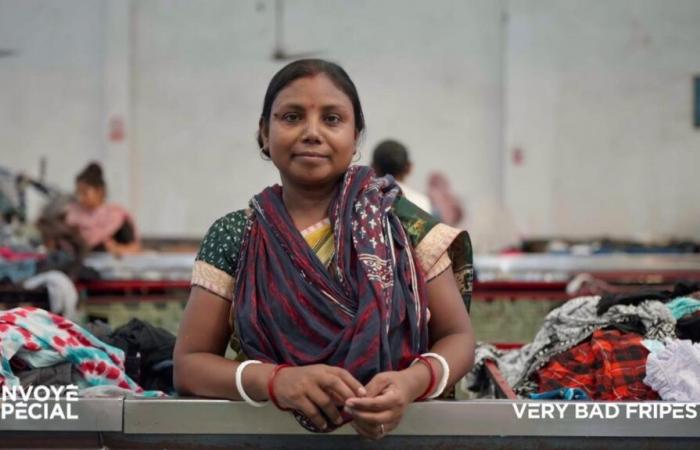For an investigation into the not-so-ethical second-hand clothing circuit, “Special Envoy” followed Protima, a sorter in a factory in Kandla, in western India, throughout her (double) working day.
For an investigation into the globalized second-hand clothing circuit, “Special Envoy” crossed borders to India, the hub of sorting in this sector. The port of Kandla, in the west of the country, receives mountains of containers full of used clothing. They arrive here only to be sorted, and then leave for the four corners of the world… where they came from.
Before heading back to the European cupboards, they pass through one of the sorting centers in the special economic zone, which has around fifteen. The huge US Clothing factory employs 450 employees to process the 40 tons daily that arrive here. All sorting is done by hand, assembly line work at a sustained pace. Behind a treadmill, we meet Protima.
Protima is 37 years old, and she has already been working on the line for around twenty years. But she is happy that Westerners throw away their clothes, because it gives her work… Hers consists of picking up the pants and nightgowns that pass on the conveyor belt; in front of her, her colleague takes care of the t-shirts and shorts.
Tedious and back-breaking work, in stifling heat despite the fans. “By staying up for eight hours, confides Protima, my feet are swollen. Sometimes I even have to stop working because my feet hurt too much!” At the impatiently awaited 1 p.m. break, the workers only have twenty-five minutes for lunch, among the used clothes that serve as carpets.
Finally, the evening siren sounds. At the end of her working day, “Special Envoy” followed the young woman to her village, about thirty minutes from the factory. Protima takes her place in the tuk-tuk, relieved to finally be able to sit down.
She really needs to rest, but she is not entitled to paid leave. The 400 rupees (around 4 euros) she earned today would not have been paid to her if she had not come to work. To sort our old clothes, she receives a monthly salary of 80 euros which is not enough to live on. Fortunately, her husband, also a factory worker, receives a better salary, around 200 euros per month. Enough to allow the family to get by, just barely.
With their two children, the couple lives in a small room rented for 40 euros per month. A bed, a small gas stove, a few saris hanging on a thread… Here, we eat on the floor, then we sleep in the same place, after mopping the floor.
After eight hours of work, a second day awaits Protima: dishes, laundry, washing the children, cleaning, cooking. “I never stop. As long as I'm alive, I work.” Facing the camera, Protima smiles valiantly, but this life weighs on her: “I don't know what to do, she sighs. My parents were very poor. I married for love, and he was also very poor. So you have to work to eat.” She ends up confiding her despair: “Sometimes I think about dying. How many more sacrifices do I have to make? I was very young when I started working. My body is no longer keeping up.”
Excerpt from “Very bad fripes?” a report to be seen in “Special Envoy” on November 21, 2024.
> Replays of France Télévisions news magazines are available on the Franceinfo website and its mobile application (iOS(New window) & Android(New window)), section “Magazines






